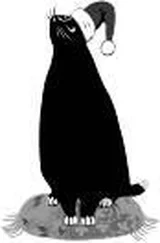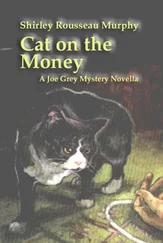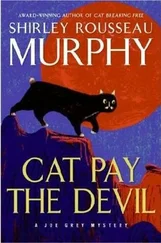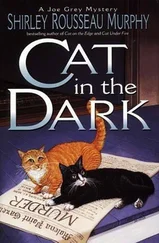Shirley Murphy - The Catswold Portal
Здесь есть возможность читать онлайн «Shirley Murphy - The Catswold Portal» весь текст электронной книги совершенно бесплатно (целиком полную версию без сокращений). В некоторых случаях можно слушать аудио, скачать через торрент в формате fb2 и присутствует краткое содержание. Год выпуска: 2005, ISBN: 2005, Издательство: HarperCollins, Жанр: Старинная литература, на английском языке. Описание произведения, (предисловие) а так же отзывы посетителей доступны на портале библиотеки ЛибКат.
- Название:The Catswold Portal
- Автор:
- Издательство:HarperCollins
- Жанр:
- Год:2005
- ISBN:9780060765408
- Рейтинг книги:4 / 5. Голосов: 1
-
Избранное:Добавить в избранное
- Отзывы:
-
Ваша оценка:
- 80
- 1
- 2
- 3
- 4
- 5
The Catswold Portal: краткое содержание, описание и аннотация
Предлагаем к чтению аннотацию, описание, краткое содержание или предисловие (зависит от того, что написал сам автор книги «The Catswold Portal»). Если вы не нашли необходимую информацию о книге — напишите в комментариях, мы постараемся отыскать её.
The Catswold Portal — читать онлайн бесплатно полную книгу (весь текст) целиком
Ниже представлен текст книги, разбитый по страницам. Система сохранения места последней прочитанной страницы, позволяет с удобством читать онлайн бесплатно книгу «The Catswold Portal», без необходимости каждый раз заново искать на чём Вы остановились. Поставьте закладку, и сможете в любой момент перейти на страницу, на которой закончили чтение.
Интервал:
Закладка:
They entered a small chamber with whitewashed stone walls. It held a chair, a table, a pitcher of water and a bowl, a towel and a crock of soap. “Wash yourself. Comb your hair. You do have a comb?”
“No.”
The woman fished in her pocket and handed her a dirty comb. “And sponge your dress. Make yourself acceptable for the queen.”
“I do not seek audience with the queen. I want only to work in the scullery.”
“The queen sees all who seek scullery work. Don’t dawdle.” Briccha gave her a harsh stare, and left her.
Angrily Melissa spell-locked the door, then dropped her dress and scrubbed thoroughly and slowly, luxuriating in the soap and clean washcloth and clean towel.
Soon, refreshed, she washed the comb, scrubbing it with the washcloth then the towel, then she combed her hair.
She was left in the room for hours. She paced, then sat down and closed her eyes, trying to keep her temper in check. She loved idleness on her own terms. She detested idleness enforced by others. She was nearly asleep when the door rattled but didn’t open. Hastily she removed the spell that locked it.
A thin serving girl entered bearing a plate of bread and a mug of milk—a bone-thin girl, maybe thirteen, with a bluish cast to her skin. She looked Melissa over shyly. “You are another,” she said softly. “Do you know why you were brought here?”
“I wasn’t brought. I came on my own. To work.”
“But I saw you ride in behind the captain.”
“I met the soldiers on the way. What do you mean, brought? Were you brought here by soldiers?”
The girl had gray smudges under her eyes. Her hair was lank, her eyes the color of mud. She was a valley elven child. “We all were brought here or summoned. Surely the soldiers brought you at the queen’s orders.”
“I told you, I met them by chance. Why would anyone want to bring me here?”
“The queen summons many girls. Some stay to work. Most are sent home again.”
“Why would she summon them then send them home again?”
“I don’t know why. But many of us are glad to be allowed to stay. The palace food is good, and this life is better than herding sheep.”
Melissa wondered if that was true. At least herding sheep, you were your own boss.
“What is your name?”
“Terlis.”
“What if I refuse to talk to the queen?”
Terlis stared at her. “You wouldn’t dare to do that. No one would dare.”
A long time after Terlis left her, a woman soldier came for Melissa—a sturdy creature with a scar down her neck. She herded Melissa through passages and up two flights of stairs, then down a main passage to a black door. She knocked, pushed Melissa through, and shut the door behind her.
The huge chamber was nearly dark. She could see quantities of black furniture that crouched like waiting beasts. Splinters of green light pushed in through the far shutters. Across the room, five spell-lights began to glow, circling a black throne. Within the throne’s dark embrace sat the queen of Affandar.
At first all that was visible was the white oval of the queen’s face suspended in blackness, then slowly, as Melissa approached, she made out the queen’s elaborately coiled black hair against the black throne, her black robe. When suddenly the queen moved, she revealed white hands flashing with jewels. “Kneel! You are to kneel!”
She knelt, feeling awe and fear. She thought that her own small powers of magic had likely been stripped away, that if she tried to use any spell to protect herself from this woman she would fail.
“Look up at me.”
She looked up into the queen’s black eyes, wary as a caged beast. The queen gave her a cold smile, but then her eyes widened, and her pale mouth twitched. She lifted her white hand and brought a spell-light bright across Melissa’s face.
Queen Siddonie studied her for so long that Melissa, kneeling, felt her legs cramp. She could see no expression in the queen’s black eyes. The power of the woman’s stare made her weak and angry. Stories of Siddonie’s cruelty filled her. She felt her heart pounding, and only with great effort did she keep her face blank.
At last the queen sat back and folded her hands. “You may rise. What is your name?”
“I am Sarah.”
Rage flashed in Siddonie’s eyes. “What village do you come from—Sarah? Tell me why you have come to Affandar.”
“Appian is my village. My father could not keep us all. I came to find work in the palace.”
“What work does your father do?”
“He mines a little,” Melissa said, forcing quiet into her voice, counting on Appian to be so far away and so crowded that the queen would not bother to investigate. And why should she? What difference where she came from? “He makes some jewelry, and grows barley and pigs.”
Another long silence as the queen watched her, a look that made her stomach twist with fear. But then suddenly in the queen’s eyes something almost vulnerable shone: Siddonie’s face softened, for an instant her smile was almost gentle. “You will start in the kitchens, Sarah. You will report to Briccha. If you are a good worker there may be other chores.” Then suddenly her fists clenched and she half rose. “You are dismissed. Rise and get out. Now! ”
Alarmed, Melissa backed quickly to the door. And her anger rose so fiercely she had to restrain herself from hissing curses or from striking out at the queen. She fled, enraged—and shocked at herself.
Outside the door she stood, regaining her breath, almost more frightened of her own fierce reactions than of Queen Siddonie.
Chapter 7
Braden was parking the station wagon after a pointless drive up the coast when he saw his neighbor, Olive Cleaver, come down the garden and go into the tool room carrying a camera and notebook. Olive was in her seventies, a skinny woman with parchment pale skin made more sallow by her garishly flowered house dresses: Woolworth designs of raw color so terrible they were wonderful. This one featured giant orange and yellow nasturtiums on a black ground. Its garishness shocked all color from Olive’s bare legs and wrinkled arms and face. As she entered the tool room, she smiled and waved at him. He wondered what she was going to shoot in there with the Rolleiflex. Olive, strictly an amateur, did some passable work. He opened the back of the station wagon and retrieved his duffel bag and paint box. He’d packed extra shorts and socks and his razor, but he hadn’t stayed anywhere, had turned around again and come home.
He had driven north toward the wine country and Russian River on a sudden whim, wanting to get away, but something—boredom, a sense of uselessness—had made him head back again. He had felt as confined in the car as he had felt in the studio; the same stifled sense of captive panic he’d had after the war when he marked time in England for three months without any action. Driving north, he had changed his mind about going to Russian River—the place stirred too many memories. He’d wondered why the hell he had thought he could go there, and he had cut off 101 suddenly onto the narrow road to Bodega Bay.
He and Alice had gone to Russian River before they were married, in the middle of winter, and pitched a tent. They had had the place to themselves. They’d cooked on a campfire and had swum nude in the icy river. The first night, Alice spilled chocolate syrup in the sleeping bag, and for a week afterward they had made love and slept engulfed by the smell of chocolate.
Heading for Bodega Bay, passing green pastures where dairy cows grazed, he had let his mind stay numb and blank. At the shore he’d walked along the beach for several hours not thinking, watching the sea, trying to become a part of whatever it was out there—the rhythm of the waves pounding, the emptiness of sky and sea meeting unbroken, hinting at some kind of meaning he couldn’t touch. Alice had loved the sea, she would have been running out in the cold water picking up shells, would have sat on a rock shivering, drawing the gulls and plovers.
Читать дальшеИнтервал:
Закладка:
Похожие книги на «The Catswold Portal»
Представляем Вашему вниманию похожие книги на «The Catswold Portal» списком для выбора. Мы отобрали схожую по названию и смыслу литературу в надежде предоставить читателям больше вариантов отыскать новые, интересные, ещё непрочитанные произведения.
Обсуждение, отзывы о книге «The Catswold Portal» и просто собственные мнения читателей. Оставьте ваши комментарии, напишите, что Вы думаете о произведении, его смысле или главных героях. Укажите что конкретно понравилось, а что нет, и почему Вы так считаете.












